Butter Extract Is The Pantry Secret You Need For Convenient Bakes
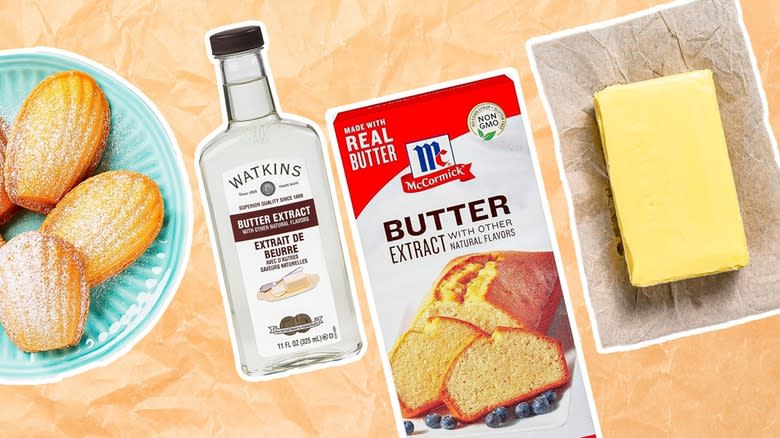
We may receive a commission on purchases made from links.
If you want to add flavor to your recipes, food extracts are the way to go. These liquid concoctions take the flavor out of a food and turn it into a usable ingredient. This process, called extraction, pulls components out of an ingredient that don't normally separate, like removing the vanilla flavor from a vanilla bean. This is achieved by adding another component, like a solvent, to the base.
Extracts impart a kick of extra flavor to your recipes and are commonly used for baking, though there are some savory applications for them as well. These compounds allow you to better control certain flavors because they're so potent. You can add a single drop or several teaspoons, depending on how strong you want a flavor to be in your dish. Plus, using extracts allows your chosen flavor to blend more seamlessly into a recipe, whereas the original ingredient, like vanilla beans or orange peels, would stick out.
There are many types of extracts out there. Vanilla extract is popular for cakes and cookies, but you may also come across a more uncommon one: butter extract. This ingredient can deepen the butter flavor of whatever you're cooking. If you love buttery food and want to avoid dumping extra tablespoons of the real thing into your dish, butter extract is the way to go. Here's what you need to know about what makes this ingredient stand out from other extracts and how to optimize its use in your kitchen.
Read more: 12 Popular Grocery Store Butter Brands, Ranked
What Is Butter Extract?
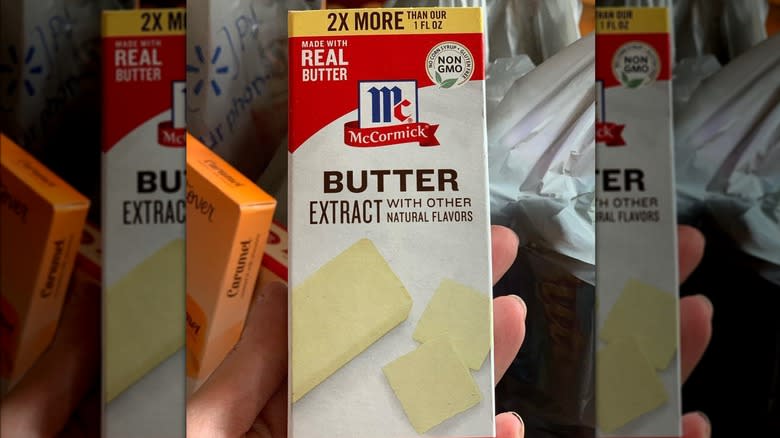
Butter extract different than other food extracts. It is made from heated cream that's been mixed with another ingredient, like alcohol, to extract the unique, buttery flavor. Some versions of butter extract also have vanilla extract in it, so be sure to check the label before you use it so you're not overwhelming your recipe with too much vanilla.
Real butter extract contains dairy allergens, but vegans and those with dairy allergies may be able to use imitation butter extract, which is made with artificial compounds rather than real butter. This ingredient is a great addition to cuisines and dishes that would otherwise require a ton of butter, such as many French recipes. You'll essentially get all that delicious butter flavor without the extra calories and mouthfeel of the real thing.
It's important not to confuse butter extract and butter flavoring. Butter flavoring is instead made with from water and butter. The process pulls out isolated compounds in the butter, such as diacetyl, acetyl propionyl, or acetoin. Then, these isolates are mixed with alcohol or propylene glycol. Together, these compounds create a highly-concentrated butter flavor. While butter flavoring has a long shelf life, it is highly processed and is mainly used to enhance butter flavor in food products.
On the other hand, butter extract is easily extracted from butter or heavy cream using a solvent. It also contains all of the butter's flavor compounds, rather than just a few isolated ones.
Important Considerations When Cooking With Butter Extract
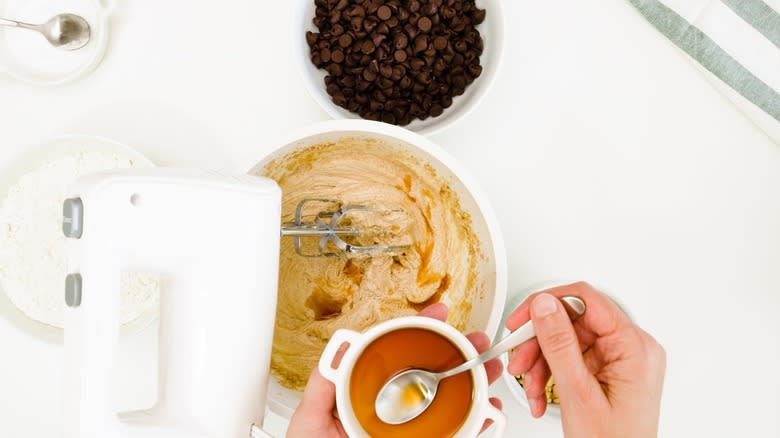
There are no harmful effects of consuming or cooking with butter extract. In fact, there might even be some considerable benefits, especially if you are looking for something to add butter flavor without the fat or caloric content of the real stuff. Keep in mind that if your recipe uses butter for a structural purpose, like to hold air in cookie dough or keep a cake moist, you'll still need to find a reliable butter substitute. Butter extract won't mimic the same texture as the actual fat, but it will amplify the flavor. That's why butter extract may be useful in tandem, rather than as a complete replacement, for real butter.
The only downside to butter extract is that you can ruin a dish if you don't use it properly. Because it is concentrated, like any food extract, a little too much extract can overwhelm, rather than complement, the flavors in your dish. As you familiarize yourself with cooking with butter extract, it's best to experiment by testing a few drops in your recipe and then tasting each time before you add more in. This is especially true if you're using homemade butter extract, since you can't follow the brand's guidelines for use.
How To Make Your Own Butter Extract
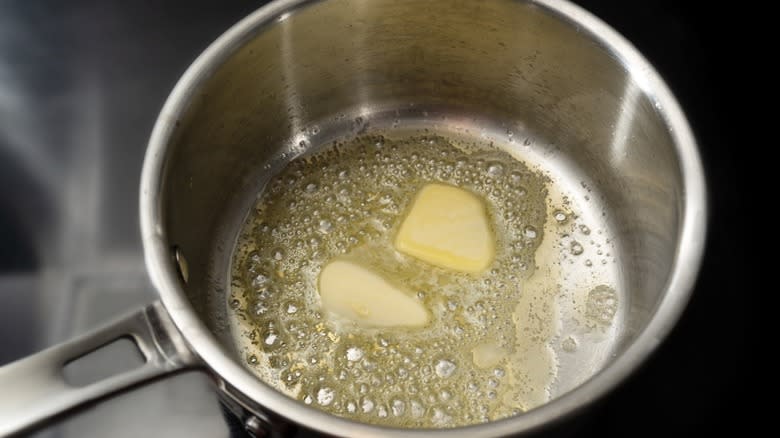
It's fairly simple to make your own butter extract. It only requires two ingredients: unsalted butter and high-proof vodka. This process may take a little time, but you won't have to buy expensive extracts if you can make it yourself. Plus, it also gives you better control over the taste of the finished product.
Start with a high-quality, grass-fed butter or a reliable brand of standard butter. You'll want to make sure it's real butter, because margarine and vegan butter won't give you the same flavor. You can also opt for a high-fat butter to make your extract. European butter might even be better than American, since it has 2% more butterfat. Lower-fat butters just don't have the same flavor. Moreover, flavored butter may not taste right either, and it may alter how the solvent performs. You also have a large variety of excellent vodka brands to choose from for your extract. You'll want to choose a high-quality one with no added flavor because the finish on the alcohol can impact the taste of your extract.
To make your butter extract, you'll need to melt the butter before adding your solvent, and then strain out the fats and hard residue. The butter extract can then be stored in an airtight container for all your cooking needs.
The Best Ways To Use Butter Extract In Sweet Recipes
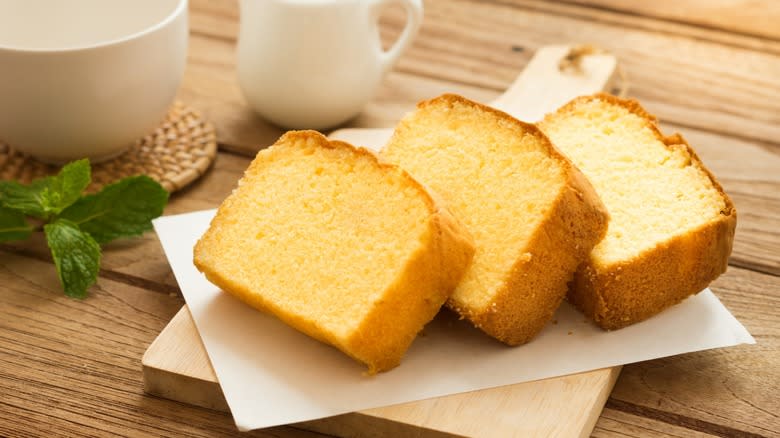
The best applications for butter extract are, undoubtedly, sweet baked goods. Butter cookies are a great starter recipe for experimenting with butter extract. Simply replace the vanilla extract with a vanilla-infused butter extract in your recipe to get the best of both worlds.
We also recommend trying butter extract in pastry recipes, since these treats benefit from that rich, buttery taste. You can also integrate butter extract into your everyday cooking routine, like adding a few drops into your pancake or waffle batter to eliminate the need to top them with butter. Just skip to pouring the maple syrup.
Another idea is adding butter extract to frosting recipes to emulate buttercream. You can even make icing without butter by replacing it with substitutes like margarine, shortening, cream cheese, or if you're daring enough, coconut oil. This last option will melt quickly, so be sure to keep it refrigerated.
Butter extract is also a great way to elevate homemade ice cream, especially in a butter rum or butter pecan flavor. The extract can give the ice cream that rich flavor without altering the texture. You can also try your hand at making a Butterbeer with cream soda, caramel extract, butterscotch syrup, and, of course, butter extract.
How To Use Butter Extract For Savory Recipes
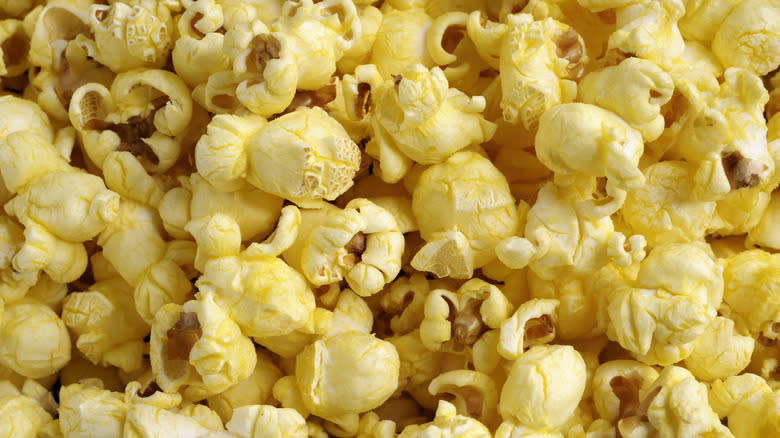
Butter extract is a also nice addition to any savory, buttery recipes, including chateaubriand and savory compound butter. Not only does it enhance the flavor of the dish, but it also makes it feel more upscale. French dishes, like a French omelet, would be a great place to start because the butter extract could impart that noticeable flavor without the extra calories. A few drops can also add a rich flavor to savory sauces, even those made without butter in the first place. White sauces, like Alfredo, for pasta or seafood will benefit from a few drops of butter extract as well.
Savory snacks are a perfect fit for butter extract too. Any dip, like a garlic butter sauce, suitable for fresh bread and soft pretzels would benefit from some of this unique extract. Butter extract is also an excellent addition to popcorn. It's believed that butter extract paved the way for the classic movie theater butter popcorn, so why wouldn't you want to try some on your next batch? So many savory dishes can benefit from butter extract that it's worth it to have this ingredient in your pantry.
How To Replace Butter Or Other Extracts With Butter Extract
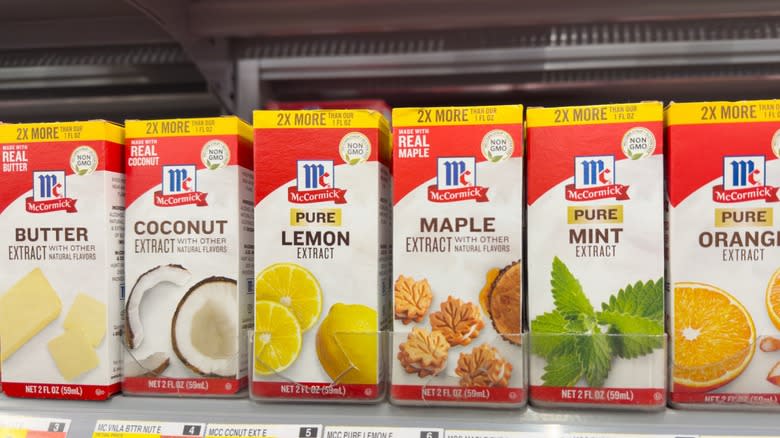
Despite the fact that butter extract is meant to add buttery flavor to a dish, you can also use it to replace other extracts, like vanilla, to accentuate certain flavors. If you're swapping butter extract for vanilla extract, we recommend you find a butter extract that has vanilla in it.
Ratios are very important when substituting extracts in a recipe. This proportion is impacted by the strength of the respective extract. Since butter extract is milder than most, you'll need to make adjustments with strong extracts like vanilla. For example, you'll need to use half as much vanilla extract as butter extract. Almond extract is even more potent, so you'll need to use 1 teaspoon for every tablespoon of butter extract. Butter flavoring, on the other hand follows a simple 1-to-1 substitution ratio.
You can also substitute butter extract for certain oils. The substitution ratio is 1-to-1 for canola, olive, and coconut oils. Sunflower oil is different, though. Swap ½ tablespoon of sunflower oil with 1 tablespoon of butter extract.
If you're looking to lower the fat content of a butter-heavy sauce, soup, or dip, try substituting the extract for the regular butter. 2 tablespoons of butter extract can replace one whole stick of butter. Of course, that's going to be a major change to the texture and consistency of your recipe, so be sure to taste before serving. Otherwise, feel free to get creative.
Storing Butter Extract
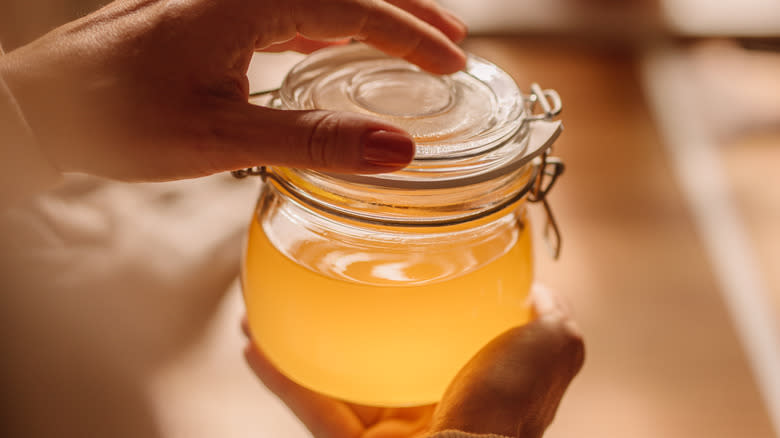
If you're buying bottled butter extract from a name brand, you can keep it in your cabinet, pantry, or other dark, cool areas when not in use. It should last between six months to one year from the date of opening, but be sure to check expiration dates as well. The extract will be less potent after it's been sitting for so long. Homemade butter extract does not need to be stored in your refrigerator. Instead, it canbe stored in a cool, dark place. It can last and hold its flavor for up to one year.
You must make sure that you use an airtight lid on your homemade extract and seal it tightly. When you're ready to use it, give it a quick inspection and throw it away if it is flavorless or spoiled. As always, be sure to allocate enough time to find a replacement in case your homemade or store-bought container has gone bad.
Where To Buy Butter Extract
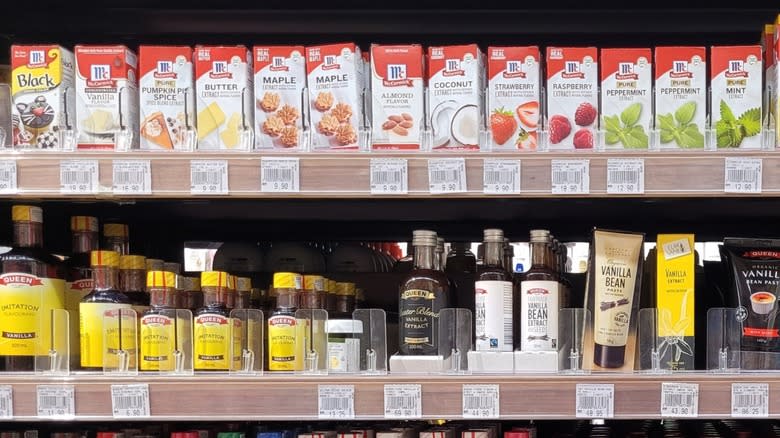
It's pretty simple to make and store your own butter extract, but it's even easier to purchase. This ingredient might be difficult to find in some grocery stores, but if your supermarket carries it, it will be in the dedicated baking or seasoning aisle. You can also find it at specialty stores that cater to baking. Be careful not to confuse it with butter flavoring, is often shelved in the same section. You should also check whether or not it contains vanilla and whether it's real or imitation.
There are only a few major brands that have this extract, including McCormick, Watkins, and OliveNation. Butter extract has a ton of uses in the kitchen, so you might want to consider buying in bulk once you are used to cooking with it.
Purchase McCormick butter extract with other natural flavors (2 ounces) at Walmart for $4.43.
Purchase Watkins imitation butter extract (2 ounces) on Amazon for $9.99
Purchase OliveNation natural butter flavor extract (8 ounces) on Amazon for $10.81
Read the original article on Tasting Table


